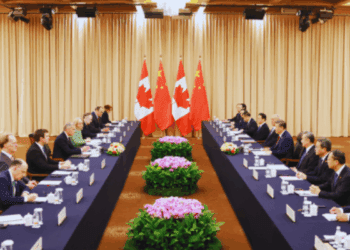This article originally appeared in the Line.
By Peter Menzies, October 9, 2024
The Liberal government’s stubborn refusal to recognize there are limits to its power and consequences to its actions is about to have a harsh and direct impact on the cost of streaming services in this country.
This month — and this comes as no surprise to anyone who understands how the grownup world works — Spotify announced it was increasing prices in Canada. Yes, this isn’t the only country where the online music company increased prices but the hike is also something Spotify and others had cautioned the Canadian Radio-television and Telecommunications Commission was inevitable if it implemented the Online Streaming Act (Bill C-11) they way it feared it would.
The CRTC did exactly what was expected of it and late this spring implemented a five per cent levy (go ahead, call it a tax) on all streaming companies operating in Canada with annual revenues in excess of $25 million. And that means Canada’s most popular music streaming services — YouTube Music and Spotify — had to, as of Sept. 1, hand over that loot to support, as the CRTC put it, “areas of immediate need in the Canadian broadcasting system, such as local news on radio and television, French-language content, Indigenous content, and content created by and for equity-deserving communities, official language minority communities, and Canadians of diverse backgrounds.”
Whew.
Why music streamers need to support local news is the subject for further discussion in the future. Suffice to say for now that it illustrates the utterly illogical nature of the legislation (Bill C-11) that put the CRTC in charge of the internet — a 21st-century reality — in order to force it to support the 20th-century world it has long coddled and governed.
The week prior to Spotify’s announcement, Netflix made it clear that, also as a result of the CRTC’s decision, it was no longer going to be sponsoring multiple Canadian film and TV training programs into which it had invested $25 million since 2017.
The bad news doesn’t stop there. In June, Canada ran out of patience waiting for international agreement on a Digital Services Tax and decided to go it alone and implement a three percent tax on foreign (ie American) tech giants’ Canadian income retroactive to Jan. 1, 2022. Right on cue, Google announced it would pass along most of that to its advertisers in the form of a 2.5 percent surcharge. Advertisers are unlikely to simply absorb the hit, meaning you know who will wind up covering it.
The unilateral tax also angered Washington and has left Canadian business leaders fearful.
As the Canadian Chamber of Commerce put it, “In the short-term, you’ll feel the pinch as the cost of your daily digital services increase and the value of your rewards programs decrease. In the long-term, the Digital Service Tax will hinder Canada’s ability to innovate, grow and remain competitive in international markets.”
But wait, there’s more. So much more.
The Digital Media Association — a consortium composed of the likes of Amazon, Spotify, Apple and YouTube/Google — has launched an all-out public relations campaign aimed squarely at the current government, the CRTC, the Online Streaming Act and just about everything else Justin Trudeau’s government has been throwing up in a bid to shift the burden of Canadian cultural funding offshore.
It’s called “Scrap the Streaming Tax and, if you are so inclined, you can download your memes here. Its target is the five per cent levy the CRTC has imposed on those and other companies to, as noted, pay for “content created by and for equity-deserving communities” that the regulator somehow believes don’t have access to YouTube. (If you asked me, I’d tell you that YouTube has created more opportunities for those folks than has half a century of studious supply management by the regulator. Feel free to disagree.)
“Canadians are already feeling the pinch from rising inflation and economic pressures. The addition of a streaming tax is an unnecessary burden,” the consortium stated through Graham Davies, its president and CEO.
In its report, the Globe and Mail quoted a spokesman for Heritage Minister Pascale St-Onge as saying streaming prices were already going up and, anyway, streamers should be “finding ways to step up, not step back, and collaborate with Canada’s talented creative sector.”
Spotify, meanwhile, released its own study boasting about its strength as a platform for francophone music, an area of deep concern in Quebec where politicians and cultural activists have been worried for years about young people listening to English music. The most-listened-to francophone musicians in the world on Spotify include the awkwardly-named Patrick Watson’s Je te laisserez tes mots. He and fellow Canadians Les Cowboys Fringants and Souldia dominate en Amerique du Nord.
Into this dynamic soup of contention, you can add the fact that the CRTC’s first two major decisions following the implementation of the Online Streaming Act have solicited three separate court challenges and there’s little wonder it has set back its plans for full implementation until the end of 2025.
All of this mess was predictable from the moment the government got talked into this form of regulation for the internet — forcing those who had succeeded on this revolutionary new form of communications to adapt to Canada’s old ways of doing things instead of progressively helping cultural industries to evolve and prosper in a new technological age.
And it was extremely predictable, particularly for digital creators and the Cassandra’s among us. Indeed, it was just 11 months ago, that I wrote this in the Globe and Mail:
“The decade prior to the introduction of the Online Streaming Act was by far the most prosperous in the history of the Canadian film and television industry, including in terms of Canadian content production. Most of that growth took place beyond the reach of the CRTC, which was in charge of an increasingly irrelevant system upon which many legacy companies had grown dependent. But instead of fostering what was working, the government chose to sustain what wasn’t.
“So now, as with the Online News Act, it’s playing at a table where it no longer holds all the cards.”
And all of us are losing.
Peter Menzies is a senior fellow with the Macdonald-Laurier Institute, past vice-chair of the CRTC and a former newspaper publisher.






